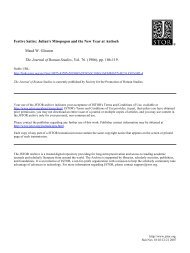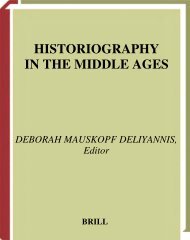- Page 2 and 3: 11112342225672228910111232224567892
- Page 4: 11112342225672228910111232224567892
- Page 7 and 8: First published 2008by Routledge270
- Page 9 and 10: viiiContentsPART THREEConsuming Pas
- Page 11 and 12: xAcknowledgmentswork and indeed far
- Page 13 and 14: 2 April Harper and Caroline Proctor
- Page 15 and 16: 4 April Harper and Caroline Proctor
- Page 20 and 21: Sexuality in Late Lombard Italy 911
- Page 22 and 23: Sexuality in Late Lombard Italy 111
- Page 24 and 25: Sexuality in Late Lombard Italy 131
- Page 26 and 27: Sexuality in Late Lombard Italy 151
- Page 28 and 29: Sexuality in Late Lombard Italy 171
- Page 30 and 31: Sexuality in Late Lombard Italy 191
- Page 32 and 33: Sexuality in Late Lombard Italy 211
- Page 34: Sexuality in Late Lombard Italy 231
- Page 37 and 38: 26 Ross BalzarettiFamily in Central
- Page 39 and 40: 28 Ross BalzarettiPress, 2001), 130
- Page 41 and 42: 30 Ross Balzaretticircumstances in
- Page 43 and 44: 2Sex and TextThe Afterlife of Medie
- Page 45 and 46: 34 Dominic JanesThe rise of the pen
- Page 47 and 48: 36 Dominic JanesMcNeill and Gamer,
- Page 49 and 50: 38 Dominic JanesThere was a long tr
- Page 51 and 52: 40 Dominic Janesbenevolence in a
- Page 53 and 54: 42 Dominic JanesNotes1. Oscar Wilde
- Page 55 and 56: 44 Dominic Janes46. Judgment of the
- Page 58 and 59: 11112342225672228910111232224567892
- Page 60 and 61: When Sex Stopped Being a Social Dis
- Page 62 and 63: When Sex Stopped Being a Social Dis
- Page 64 and 65: When Sex Stopped Being a Social Dis
- Page 66 and 67: When Sex Stopped Being a Social Dis
- Page 68 and 69:
When Sex Stopped Being a Social Dis
- Page 70 and 71:
11112342225672228910111232224567892
- Page 72 and 73:
Virtue and Violence 611111234222567
- Page 74 and 75:
Virtue and Violence 631111234222567
- Page 76 and 77:
Virtue and Violence 651111234222567
- Page 78 and 79:
Virtue and Violence 671111234222567
- Page 80 and 81:
11112342225672228910111232224567892
- Page 82 and 83:
Virtue and Violence 711111234222567
- Page 84 and 85:
11112342225672228910111232224567892
- Page 86 and 87:
Virtue and Violence 751111234222567
- Page 88 and 89:
Virtue and Violence 771111234222567
- Page 90:
11112342225672228910111232224567892
- Page 93 and 94:
82 April Harperepisode after episod
- Page 95 and 96:
84 April HarperSexual continence wa
- Page 97 and 98:
86 April Harperrelations between th
- Page 99 and 100:
88 April HarperThe references to me
- Page 101 and 102:
90 April HarperBut the lesson was a
- Page 103 and 104:
92 April HarperCatherine of Siena,
- Page 105 and 106:
94 April HarperUniversity of Bath,
- Page 107 and 108:
96 April HarperUniversity Press, 20
- Page 109 and 110:
6The Role of Drinking in the MaleCo
- Page 111 and 112:
100 A. Lynn Martinbut drink it slow
- Page 113 and 114:
102 A. Lynn MartinWith their legs b
- Page 115 and 116:
104 A. Lynn Martinnight,” 18 and
- Page 117 and 118:
106 A. Lynn Martinsuch women, espec
- Page 119 and 120:
108 A. Lynn MartinRummyng pawned th
- Page 121 and 122:
110 A. Lynn Martinseuils de l’alc
- Page 123 and 124:
112 A. Lynn Martin44. Craig MacAndr
- Page 125 and 126:
114 Caroline ProctorThis characteri
- Page 127 and 128:
116 Caroline Proctorroots, red wine
- Page 129 and 130:
118 Caroline Proctorimpregnandum. T
- Page 131 and 132:
120 Caroline Proctorcrucial, just a
- Page 133 and 134:
122 Caroline ProctorBecause there a
- Page 135 and 136:
124 Caroline ProctorNotes1. Fundame
- Page 137 and 138:
126 Caroline Proctor25. Regimen, 2:
- Page 139 and 140:
128 Caroline Proctor55. Regimen, 2:
- Page 141 and 142:
130 Caroline ProctorIdeo in hoc cap
- Page 144:
11112342225672228910111232224567892
- Page 147 and 148:
136 David Santiustewider society. T
- Page 149 and 150:
138 David Santiusteconspicuous of E
- Page 151 and 152:
140 David Santiustecleric. 32 A boo
- Page 153 and 154:
142 David SantiusteJohn Russel, exh
- Page 155 and 156:
144 David SantiusteLondon in 1483 t
- Page 157 and 158:
146 David Santiusteevery true Subje
- Page 159 and 160:
148 David Santiuste14. “Libidinis
- Page 161 and 162:
150 David Santiusteto be genuine, a
- Page 163 and 164:
152 David Santiuste59. This was a c
- Page 165 and 166:
9Scandal, Malice and theKingdom of
- Page 167 and 168:
156 Philip Crispinappear on stage a
- Page 169 and 170:
158 Philip CrispinCaptain also repr
- Page 171 and 172:
160 Philip CrispinChose Publique, w
- Page 173 and 174:
162 Philip Crispinfemmes” who wea
- Page 175 and 176:
164 Philip Crispinmajesty to the pe
- Page 177 and 178:
166 Philip Crispinwith the artifice
- Page 179 and 180:
168 Philip Crispinall too frequent
- Page 181 and 182:
170 Philip Crispin27. Demurger, Tem
- Page 183 and 184:
172 Philip Crispin62. According to
- Page 186 and 187:
11112342225672228910111232224567892
- Page 188 and 189:
Homosexuality at the Abbasid Court
- Page 190 and 191:
Homosexuality at the Abbasid Court
- Page 192 and 193:
Homosexuality at the Abbasid Court
- Page 194 and 195:
Homosexuality at the Abbasid Court
- Page 196 and 197:
Homosexuality at the Abbasid Court
- Page 198 and 199:
Homosexuality at the Abbasid Court
- Page 200 and 201:
11112342225672228910111232224567892
- Page 202 and 203:
“They Do Not Know the Use of Men
- Page 204 and 205:
“They Do Not Know the Use of Men
- Page 206 and 207:
“They Do Not Know the Use of Men
- Page 208 and 209:
“They Do Not Know the Use of Men
- Page 210 and 211:
“They Do Not Know the Use of Men
- Page 212 and 213:
“They Do Not Know the Use of Men
- Page 214 and 215:
“They Do Not Know the Use of Men
- Page 216 and 217:
“They Do Not Know the Use of Men
- Page 218 and 219:
“They Do Not Know the Use of Men
- Page 220 and 221:
11112342225672228910111232224567892
- Page 222 and 223:
Further Reading 2111111234222567222
- Page 224 and 225:
Further Reading 2131111234222567222
- Page 226 and 227:
Further Reading 2151111234222567222
- Page 228 and 229:
11112342225672228910111232224567892
- Page 230 and 231:
Contributors 2191111234222567222891
- Page 232 and 233:
Index 22111112342225672228910111232
- Page 234 and 235:
Index 22311112342225672228910111232
- Page 236 and 237:
Index 22511112342225672228910111232
- Page 238 and 239:
Index 22711112342225672228910111232
- Page 240 and 241:
Index 22911112342225672228910111232













